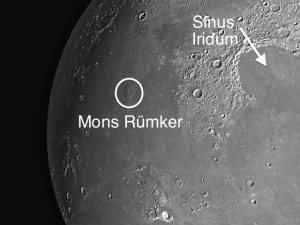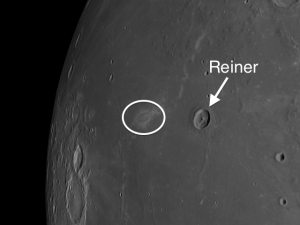The week of August 26 – September 1 takes us from Day 25 to Day 3. This week we will highlight Mons Rümker and Reiner Gamma, both visible Tuesday morning around 4:00 a.m.
 Mons Rümker: [NW/E4] Unfortunately this feature is too close to the Moon’s limb to see it very clearly, so coordinate your viewing with a favorable libration1. In spite of its name, Mons Rümker is not really a mountain, it’s an extensive complex of domes. The diameter of the formation is over 40 miles. Although there are about a dozen domes here2, through a telescope it looks like a mound with a bumpy surface. Several of the domes have summit pits. Can you make any of them out?
Mons Rümker: [NW/E4] Unfortunately this feature is too close to the Moon’s limb to see it very clearly, so coordinate your viewing with a favorable libration1. In spite of its name, Mons Rümker is not really a mountain, it’s an extensive complex of domes. The diameter of the formation is over 40 miles. Although there are about a dozen domes here2, through a telescope it looks like a mound with a bumpy surface. Several of the domes have summit pits. Can you make any of them out?
 Reiner Gamma: [NW/J4] Lunar swirls are absolutely flat features that cast no shadows but leave enigmatic whorl-like markings on the lunar surface. No known geological process could have created them, and to heighten the mystery, instruments on Apollo spacecraft measured strong magnetic fields directly over the swirls. For the fanciful, they are eerily reminiscent of crop circles. Of the three swirls on the Moon, two have been found to be antipodal features of major impact zones and mascons. All three of the swirls on the Moon (there are two on the far side) are associated with strong magnetic anomalies.
Reiner Gamma: [NW/J4] Lunar swirls are absolutely flat features that cast no shadows but leave enigmatic whorl-like markings on the lunar surface. No known geological process could have created them, and to heighten the mystery, instruments on Apollo spacecraft measured strong magnetic fields directly over the swirls. For the fanciful, they are eerily reminiscent of crop circles. Of the three swirls on the Moon, two have been found to be antipodal features of major impact zones and mascons. All three of the swirls on the Moon (there are two on the far side) are associated with strong magnetic anomalies.
1 Use the Virtual Moon Atlas to determine libration information.
2 Some sources say 30; how many can you see?
======================
It is highly recommended that you get a copy of Sky and Telescope’s Field Map of the Moon, the very finest Moon map available for use at the telescope. It is available for $10.95 at www.skyandtelescope.com and on Amazon. All features mentioned in this blog will be keyed to the grid on the Field Map and will look like this: Plato: [NW/D9]
Credits:
Courtesy of Gray Photography of Corpus Christi, Texas
Lunar photos: NASA / USGS / BMDO / LROC / ASU / DLR / LOLA / Moon Globe. Used by permission
- Rupes Cauchy: A Best Known Fault on the Moon - July 22, 2024
- Moon Crater Schickard – Crater Floor has Stripes - July 15, 2024
- Moon Craters Langrenus and Vandelinus - July 8, 2024